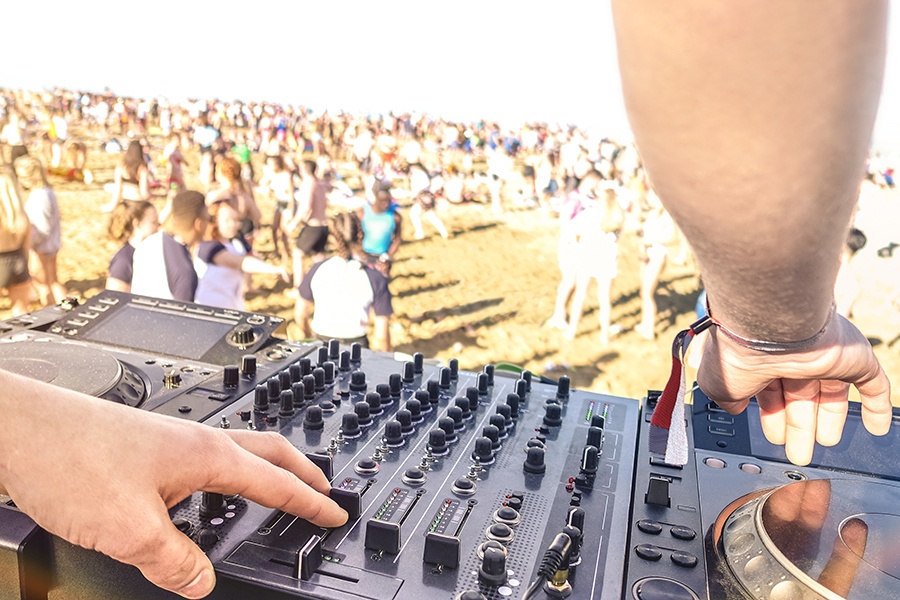Yes, the Sound from Outdoor Concerts Is Just As Harmful to Your Hearing
If you're going to Boston Calling, listen up.

Photo via Getty Images/ViewApart
Before you ditch work early on Friday to catch the first act at Boston Calling, listen up. Contrary to popular belief, even in a wide-open space like the Harvard Athletics Complex, outdoor concerts still pose a threat to your hearing. To find out why I reached out to Jonathon Whitton, director of clinical development at a hearing science bio-tech startup in Fenway called Decibel Therapeutics. Hope you’re all ears.
First, he tells me that before you can understand how loud noises like concerts can affect your hearing you must first understand how the ear works.
“Your ear has a couple main functions,” he says. “The structures in your ear responsible for those functions are different cell types called inner hair cells and outer hair cells. Both of which can experience damage from loud sounds.”
He goes on to explain that the outer hair cells function as amplifiers of sounds enabling you to hear soft things like whispers. Inner hair cells, on the other hand, sense vibrations that are amplified by the outer hair cells and send that feedback to your brain through the auditory nerve.
“When we look at hearing damage, those two places are most likely to be damaged by loud sounds over 85 decibels,” he says. “Soft sounds are about 10 decibels, talking in a normal conversation is about 50-60 decibels, and concerts are in the 100-110 decibel range.” If you damage the outer hair cells it will be harder to hear soft sounds and you’ll be that annoying person always asking “What?” And if you damage the inner hair cells it will impact how clear you are able to hear any sounds, like when you’re trying to socialize in a loud bar.
“So if you’re thinking about something like Boston Calling, there is a time exposure and a level of sound trade-off,” Whitton says. “If you have a certain level of noise it matters how long you are exposed to it to determine how much damage might happen to those cells in your ear.”
According to the Centers for Disease Control and Prevention anything under 85 decibels is within a safe range and you should limit exposure to sounds over 100 decibels to 15 minutes. Which poses a problem for weekend-long music festivals like Boston Calling. So what’s a headbanger to do?
Whitton says there are a couple things you can do. For starters, take breaks. During an all-day event you can be exposed to loud sounds for an extremely long time, so it’s important to get away from all the noise for a bit. Your proximity to the noise matters as well, so it might be worth considering not sitting front-row for every act.
“Certainly when you’re outside there are some advantages,” Whitton says. “There’s some dissipation because you’re not in an enclosed space where there is a lot of reverberation, but nonetheless the sound levels are still very high.”
If you can’t bear to take breaks or be far from the action, for fear of missing out on something awesome, Whitton says you can invest in hearing protection like foam ear plugs or musicians ear plugs. “The challenge with foam ear plugs is that they distort the sound but they do decrease loud noises by 20 decibels. Musicians ear plugs will give you a flat reduction and will keep the sound at the same pitch, just at a lower decibel level.”
And we can’t discuss concert-going without talking about tinnitus. If you don’t know what tinnitus is you’ve probably felt it before. It’s that ringing in your ears you might feel walking away from a concert, loud fireworks display, or a sporting event.
“Tinnitus is indicative of temporary hearing loss,” Whitton says. “Formerly, this was believed to not cause permanent damage but in the past 10 years we have learned that when you experience temporary hearing loss you can potentially be doing damage to your ears. And the first place you see that is in those inner hair cells and the nerves that connect to your brain.”
So if you want to ensure that you can continue hearing sounds that are music to your ears (or even music in the first place) for a long time, make sure you do a sound check every once in a while. Your ears will thank you.


